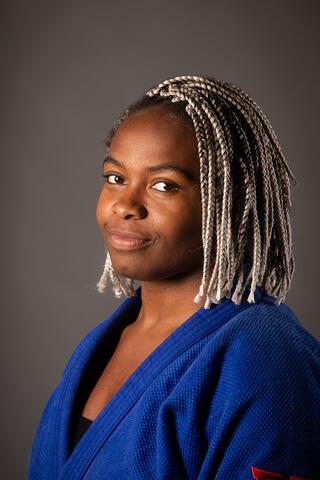
Romane Dicko
Judoka and mathematics student
I won the bronze medal at the Tokyo Olympics. This time, I'd like to go for gold!
Triple European champion, world champion and Olympic medallist... At the age of 23, Romane Dicko has a list of achievements to make you blush, and she has no intention of stopping there. Next goal for the mathematics student at Sorbonne University: gold at the Paris 2024 Olympic Games.
How did your passion for judo come about?
Romane Dicko: I started the sport in 2012 just after the London Olympics. I was watching the judo events with my dad when Audrey Tcheuméo won the bronze medal in the under 78kg category. It was a revelation! That's how my story with judo began.
What are you currently studying?
R.D.: I'm in the second year of my bachelor’s in Mathematics at Sorbonne University. I've always been good at science and math. So, once I'd passed my Baccalaureate in science, it seemed like the most natural thing to do. As soon as I've got my bachelor's degree, I'd like to go on to do a master's degree to become an aeronautical engineer.
How do you reconcile your studies with top-level sport?
R.D.: It's a bit complicated! When I go on training courses or competitions, I always try to keep one foot in college. With Sorbonne University, I'm lucky enough to be able to arrange my timetable and have one or two private lessons a week. In concrete terms, a typical day for me is an hour and a half to two hours of training in the morning, classes in the afternoon and training at the end of the day. In the evening, if I still have a bit of energy left, I work on my classes.
How is Sorbonne Université supporting you in this project?
R.D. : Of course, the High-level Athletes program and the Passport to the Olympics scholarship program run by the Foundation with the support of the bank Crédit Agricole d'Ile-de-France’s Sponsorship are all very important. Sorbonne University supports me and helps me with my dual project. It's not always possible for top-level athletes to be supported by their university or school. I'm grateful to be able to do the studies I love and my sport at the same time, while being supported by the university.
What do the Paris Olympics mean to you?
R.D.: The Paris Olympics are my goal as a top-level sportswoman. I feel lucky to be able to compete for an Olympic medal in my country and in front of the French public.
How are you preparing for it?
R.D.: As far as my studies are concerned, I'm going to adapt my timetable and choose fewer subjects next year. As far as sport is concerned, I'll be doing a series of training courses, competitions, training sessions, mental preparation... In short, I'll be doing everything I can to be the best next summer!
What are your goals for the Olympics?
R.D.: I won the bronze medal at the last Games in Tokyo. This time, I'd like to go for gold! It would be wonderful to win it at home, with my family and friends in the stands, and with the French public behind me.
Do you have a lucky charm that you carry with you to competitions?
R.D.: I always carry a belt with the words TDEVS for work, determination, commitment, willpower and seriousness. I also carry my cuddly toy, which was given to me by someone dear to my heart.
Do you have a ritual before each competition?
R.D.: I don't know if you can call it a ritual, but before a competition, my mother does my hair. She does my famous white braids. I love spending this time with her before every tournament.
What is your most vivid memory of a competition?
R.D.: The team event at the Tokyo Olympics was an unforgettable memory! It was my first Olympics and we beat the Japanese on home soil. We shared a lot of emotions within the team at that time. We're forever linked with that Olympic title.
Photographie © Mathieu Génon
Notable Achievements
Romane Dicko is part of the French delegation of judokas selected for the 2024 Olympic Games.
Individual
2023
- Gold medal - European Championships
2022
- Gold medal - European Championships
- Gold medal - World Championships
2021
- Bronze medal - Tokyo Olympic Games
2020
- Gold medal - European Championships
2018
- Gold medal - European Championships
Team
2023
- Gold medal - French Team Championships
2022
- Silver medal - World Championships
2021
- Gold medal - Tokyo Olympic Games
2017
- Bronze medal - World Championships
Romane Dicko, étudiante en maths et judoka | Hors-Champ
